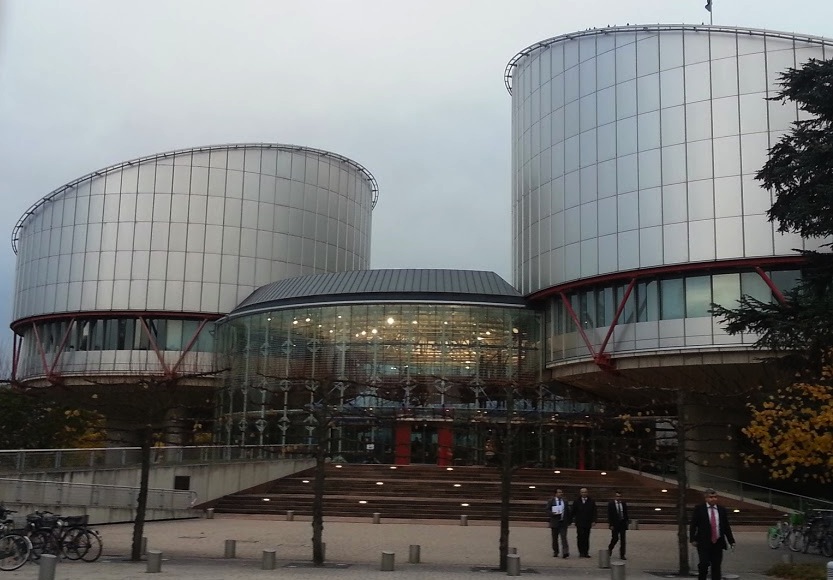

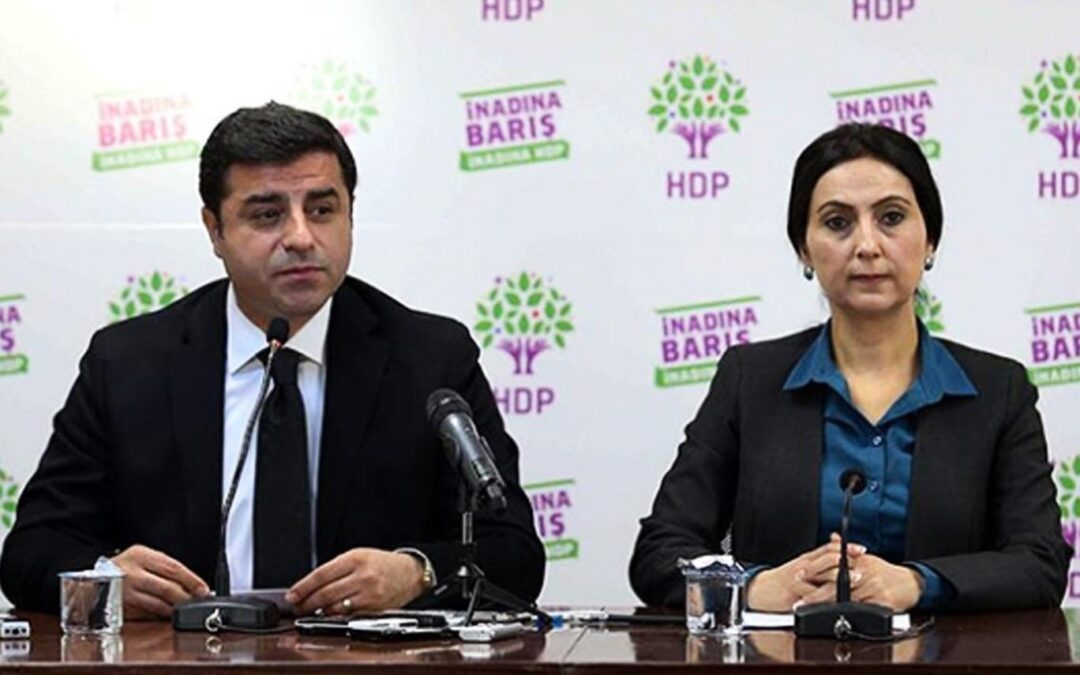
Turkey: Release Politicians Wrongfully Detained for 7 Years
Former Deputies and Mayors Face Prosecution and Prolonged Incarceration for Political Speech.
The Turkish government should abide by international law and implement the binding judgments of the European Court of Human Rights (ECtHR) by immediately releasing politicians Selahattin Demirtaş and Figen Yüksekdağ, who formerly co-chaired the opposition Peoples’ Democratic Party (HDP), four rights organizations said today.
The four nongovernmental organizations—Human Rights Watch, the Turkey Human Rights Litigation Support Project, the International Commission of Jurists, and the International Federation for Human Rights—made their call on the seventh anniversary of the politicians’ wrongful imprisonment.
“The seventh anniversary of the unlawful incarceration of Selahattin Demirtaş and Figen Yüksekdağ is a stark reminder of the Erdoğan presidency’s willingness to use detention for political ends to silence democratically elected opposition politicians representing millions of Kurdish and leftist voters in Turkey,” said Hugh Williamson, Europe and Central Asia director at Human Rights Watch. “In defying the binding ECtHR judgments ordering the politicians’ release, Turkey is flagrantly violating its legal obligations under the European Convention on Human Rights and international law more broadly.”
On November 4, 2016, months after being stripped of their parliamentary immunity, Demirtaş, Yüksekdağ and eight fellow members of parliament from the HDP were arbitrarily detained and placed in pretrial detention, with four others incarcerated over the following five months. At the time, the HDP held 10.7 percent of seats in Turkey’s parliament and was backed by over five million voters. While the 12 other deputies whose cases are covered in the ECtHR judgments are no longer in detention, Demirtaş and Yüksekdağ remain incarcerated.
All the former parliamentarians have been repeatedly prosecuted in individual proceedings based exclusively on their exercise of their right to freedom of expression, protected under international law. This included their political speeches and activities, which did not involve or advocate violence. When a mass trial was opened against them in 2021, many of those ongoing individual case files were merged. The vague and wide-reaching accusations against them in this trial include allegations of “undermining the unity and territorial integrity of the State” (separatism) and even “murder.” These accusations relate to their support for protests that mainly took place in cities in southeast Turkey between October 6 and 8, 2014. The politicians have been held responsible for all offences allegedly committed over the course of these protests, which were organized against the brutal siege of the Kurdish-majority northern Syrian town of Kobane by the extremist armed group Islamic State (also known as ISIS). During the protests, 37 people reportedly died.
The evidence against the politicians, on the basis of which Demirtaş and Yüksekdağ are currently detained, consists of two social media postings supporting protests over the Kobane siege sent from the HDP Twitter account, together with the politicians’ nonviolent political speeches, lawful activities, and witness statements against them added to the case file years later that raise serious questions of credibility.
The ECtHR determined in three judgments—two pertaining to Demirtaş in November 2018 and December 2020, and one to Yüksekdağ and 12 others in October 2022—that their detention on the basis of speeches and social media postings was a politically motivated move to silence them, “stifling pluralism and limiting freedom of political debate, the very core of the concept of a democratic society.” The court found that their rights to liberty, to freedom of expression, and to be elected had been violated. The facts forming the basis on which Demirtaş and Yüksekdağ are detained and were prosecuted for in the 2021 mass trial are substantially the same as those contained in the proceedings which the ECtHR found to be insufficient grounds for their detention.
“Despite the European Court ruling that the grounds to justify Yüksekdağ and Demirtaş’s detention were insufficient, the Ankara public prosecutor in April 2023 requested their conviction on numerous alleged offences concerning their political speech, which may result in their life imprisonment without parole,” said Temur Shakirov, interim director of the International Commission of Jurists’ Europe and Central Asia Programme. “This underscores the ultimate political motives behind the ongoing case targeting the two and reinforces doubts about the fair administration of justice in the country.”
After Demirtaş and Yüksekdağ’s detentions in November 2016, Turkey held a landmark referendum and several crucial election campaigns. The April 16, 2017 constitutional referendum introduced a system of governance concentrating power in the hands of the president. It was followed by the June 24, 2018 presidential election in which Demirtaş ran as a candidate from his prison cell against President Recep Tayyip Erdoğan, the March 31, 2019 local elections, and, most recently, the May 14-28, 2023 parliamentary and presidential elections.
“With two prominent figures of the opposition in detention, the country has been deprived of a significant measure of meaningful democratic debate and fair elections around these crucial campaigns,” said Reyhan Yalçındağ, vice president of the International Federation for Human Rights. “With the March 2024 local elections fast approaching, the Committee of Ministers and the other Council of Europe bodies need to use all available means to ensure the end of the continuing violations of Demirtaş’s and Yüksekdağ’s rights, including their rights to participation in public affairs, which is also a violation of the rights of millions of voters.”
The Council of Europe’s Committee of Ministers, responsible for overseeing member states’ implementation of ECtHR judgements, has issued six decisions and two resolutions calling on Turkey to release Demirtaş from detention. At its December 5-7 session this year, the Committee of Ministers will for the third time examine Turkey’s failure to implement the judgment pertaining to Yüksekdağ and release her from detention.
The four nongovernmental organizations have made a joint submission to the Committee of Ministers asking it to issue a decision in December calling for the release of Yüksekdağ.
“Turkey has ignored the Committee’s numerous decisions and interim resolutions calling for Demirtaş’s immediate release. This refusal to comply with Turkey’s international obligations has been repeated in the case of Yüksekdağ,” said Ayşe Bingöl Demir, director of the Turkey Human Rights Litigation Support Project. “The Committee must intensify its scrutiny against Turkey in relation to these cases without further delay, and this must include the triggering of infringement proceedings, in line with the route rightly followed in the case of the imprisoned rights defender Osman Kavala.”
Eighteen other elected former party officials and mayors from the HDP and an affiliated party, the Democratic Regions Party, are also currently detained. Among them is the prominent former elected mayor of Diyarbakır, Gültan Kışanak, detained since October 25, 2016, and Sebahat Tuncel, former co-chair of the Democratic Regions Party, detained on November 6, 2016. Kışanak’s pretrial detention has exceeded the legal limit of seven years under Turkish law, notwithstanding that seven years’ pretrial detention is a flagrant violation of international human rights law. The detentions of the politicians are blatantly arbitrary and politically motivated, and those imprisoned should be immediately released, the organizations said.
Press release in Turkish: Turkey Demirtas and Yuksekdag press release TURKISH
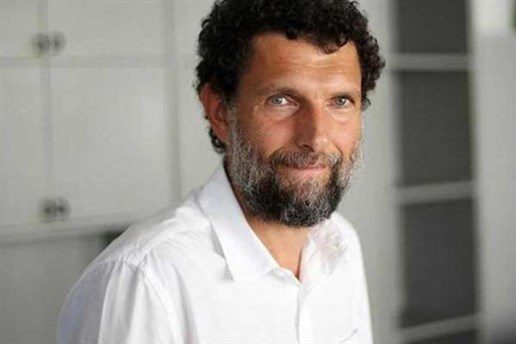
Turkey: Confirmation of conviction of human rights defender Osman Kavala and four others needs urgent international response
The prosecution of the rights defender and businessman Osman Kavala and four codefendants in connection with mass protests a decade ago has been unfair and essentially a political show trial from the beginning, a group of nine non-governmental organizations including the International Commission of Jurists (ICJ) said today, ahead of an October 12 urgent debate calling for Kavala’s release at the Parliamentary Assembly of the Council of Europe. The five have been punished for the legitimate exercise of their rights to freedom of expression, association and peaceful assembly.
On September 28, 2023, Turkey’s Court of Cassation, its top appeals court, upheld the convictions, notwithstanding that the European Court of Human Rights has previously found no basis for detention or trial, and ordered Kavala’s immediate release.
“By ignoring these judgments and Turkey’s human rights obligations, the Court of Cassation is doubling down on the deep injustice of this case that dramatically demonstrates how far Turkey has deviated from the rule of law,” said Helen Duffy of the Turkey Human Rights Litigation Support Project. “The trial has not only led to grave violations of the rights of Kavala and the others, but it provided a chilling example of how Turkey’s justice system has become a tool of political repression.”
Although President Recep Tayyip Erdogan and Turkish government officials repeatedly state that Turkish courts are independent, the trial of Kavala and his codefendants exposes those claims for the falsehood they are, and demonstrates how in key cases of interest to the president, prosecutors and courts blatantly do his bidding.
Kavala was sentenced to life in prison without parole, convicted of attempting to overthrow the government on false allegations that he organized and financed the 2013 Istanbul Gezi Park protests against a government urban development project. Four codefendants – Çiğdem Mater, Can Atalay, Mine Özerden and Tayfun Kahraman – received 18-year sentences for allegedly aiding Kavala, while the court quashed the 18-year sentences of Mücella Yapıcı, Hakan Altınay and Yiğit Ekmekçi, and ordered Yapıcı and Altınay’s release pending retrial.
“This trial cynically opened six years after the Gezi Park protests with the malevolent intent of casting them as the outcome of a grand conspiracy by one man, Osman Kavala,” said Hugh Williamson, Europe and Central Asia director at Human Rights Watch. “To achieve this the prosecution and the courts blatantly had to ignore all the evidence of spontaneous mass protests in which the vast majority of protesters committed no violence and exercised their lawful rights to freedom of expression and assembly.”
The Court of Cassation’s 78-page verdict simply reiterates the prosecution’s allegations in the February 2019 indictment, though the European Court of Human Rights ruled twice that the indictment offered insufficient evidence to justify Kavala’s detention, prosecution or conviction, and by inference, the other defendants’.
Notably, in a striking rebuke to the European Court of Human Rights, Council of Europe, and Turkey’s human rights obligations, the Court of Cassation makes no reference to the repeated findings against Turkey in this case. In December 2019, the European Court ordered Kavala’s immediate release, and in February 2022, the Committee of Ministers of the Council of Europe, the body responsible for overseeing implementation of European Court judgments, took the almost unprecedented step of triggering infringement proceedings against Turkey for its refusal to comply.
This led to a second European Court of Human Rights judgment condemning Turkey’s failure to carry out the first, and the failure of the Turkish court convicting Kavala and others on April 25, 2022, to recognize the European Court of Human Rights’ judgment. The Court of Cassation decision doubled down on that rejection of the European Court’s role, with no mention of that judgment.
Turkey’s European and international allies, both unilaterally and through intergovernmental organizations, including the Council of Europe, the European Union, and the United Nations, should address this injustice as a matter of urgency. They should treat the case as a priority human rights matter in their mutual relations with Turkey, and push for the swift and full implementation of the European Court’s’ judgments, including for the defendants’ immediate release.
They should firmly condemn the abuse of criminal law against activists, human rights defenders, journalists and others in politically motivated cases. Robust efforts are essential to ensure that Turkey respects and abides by its human rights obligations and rule of law principles, which are currently being flouted with impunity.
In turning a blind eye to the Strasbourg court’s rulings, the Court of Cassation is also ignoring its constitutional obligation to ensure that Turkey adheres to binding decisions of the European Court, which take precedence over rulings in Turkey’s domestic courts.
“In direct contravention of its legal obligations under international law, the Court of Cassation has chosen to maintain convictions despite the European Court of Human Rights judgment ordering Kavala’s immediate release,” said Temur Shakirov, ICJ Europe and Central Asia Director (ad interim). “By failing to adhere to its obligations, the Court of Cassation sets a precedent, eroding confidence in the legal system’s ability to act as an independent and impartial institution, separate from political influence and committed to upholding human rights and the rule of law.”
The Court’s Flawed Reasoning
In its September 29 decision, the Court of Cassation relies on a chronology of events from the February 2019 indictment that the prosecution argues constituted the preparation for the Gezi protests. This included making a short video with a group of actors in 2011 called “Rise up Istanbul,” production of a play in Istanbul about a dictator, which ran from 2012-13, and the 2012 establishment of the civil society platform, Taksim Solidarity, focused on the highly contested plan to develop Taksim Square and Gezi Park. The court fails to show any causality between these lawful activities and any crime or to provide any evidence that these activities showed that Kavala and the other defendants were involved in a conspiracy.
The court decision makes reference to the protests and popular uprisings in various Middle Eastern countries that predated the Gezi protests and came to be known as the Arab Spring, and nonviolent civil disobedience movements such as OTPOR in Serbia a decade earlier, without showing their relevance to the case.
The decision names civil society organizations and alleges they “supported and directed” the Gezi Park protests without providing any credible evidence. Chief among them are the Open Society Foundations, set up by the US financer and philanthropist George Soros, and the affiliated but independent (and now dissolved) philanthropic foundation in Turkey (Açık Toplum Vakfı). Kavala was a founding member of the group, and Altınay served for a period well before the Gezi Park protests as director of the board.
The court repeats a conspiracy theory, informed by antisemitic tropes, from the original indictment that Soros’s organizations aimed to overthrow governments in various countries by encouraging uprisings, and that the Turkish Open Society Foundation and Kavala were involved in this process under the guise of innocent-looking philanthropic activities.
Kavala’s own civil society group, Anadolu Kültür A.Ş., which supports the arts, was also named. The other defendants were linked to Kavala through their participation in that organization: film producer Çiğdem Mater, employed as an advisor, Mine Özerden, a member of the board, and Yiğit Ekmekçi, deputy head of the board. Taksim Solidarity is named as the group in which three defendants – lawyer Can Atalay, city planner Tayfun Kahraman and architect Mücella Yapıcı – participated actively.
The Court of Cassation endorses the indictment’s inclusion of Kavala’s contacts with bodies such as the European Commission, members of the European Parliament, diplomats, diplomatic missions and international human rights groups, as evidence of alleged efforts to influence international opinion against the Turkish government.
A section on the alleged protest financing cites the Open Society Foundations’ funding of the Turkish Open Society and Anadolu Kültür, but it omits that a formal investigation into the funding cited in the indictment (the MASAK report) found no evidence of unaccounted for money transfers. Instead, the court relies on examples drawn from wiretapped conversations, of Kavala once bringing people camped in the park a few bread rolls, talking about obtaining a plastic table for use in the park, and where to buy masks and goggles to protect from police tear gas.
The court decision also allows as admissible evidence a mass of random wiretapped conversations between the defendants and others that were illegally obtained. Far from revealing any criminal activity, the conversations show that the defendants were lawfully engaged in civil society organizations and nonviolent activism, and were exercising their rights to free speech, association, and assembly. Such activities are strictly protected under international law, including treaties to which Turkey is a party such as the European Convention of Human Rights and the International Covenant on Civil and Political Rights, as well as in Turkey’s own laws.
The decision rejects parliamentary immunity from prosecution for one of the defendants, Atalay, a lawyer and activist who won a seat in the May 2023 parliamentary elections on behalf of the Workers’ Party of Turkey. The Court of Cassation decided that he was not protected by parliamentary immunity under article 83 of Turkey’s Constitution in relation to this case confirming its own July 13 decision on the matter, and upheld his conviction. In reaching this conclusion, the Court of Cassation rejects the case law of the Constitutional Court, given under identical conditions, in judgments related to other jailed parliament members, Ömer Faruk Gergerlioğlu and Leyla Güven, which held that they do have immunity and that arresting, prosecuting, and detaining them constitute very serious violations of that immunity.
The nongovernmental organizations who signed the statement are:
- Amnesty International
- ARTICLE 19
- Human Rights Watch
- European Democratic Lawyers (AED)
- European Lawyers for Democracy and Human Rights (ELDH)
- International Commission of Jurists
- International Federation for Human Rights (FIDH)
- PEN International
- Turkey Human Rights Litigation Support Project.
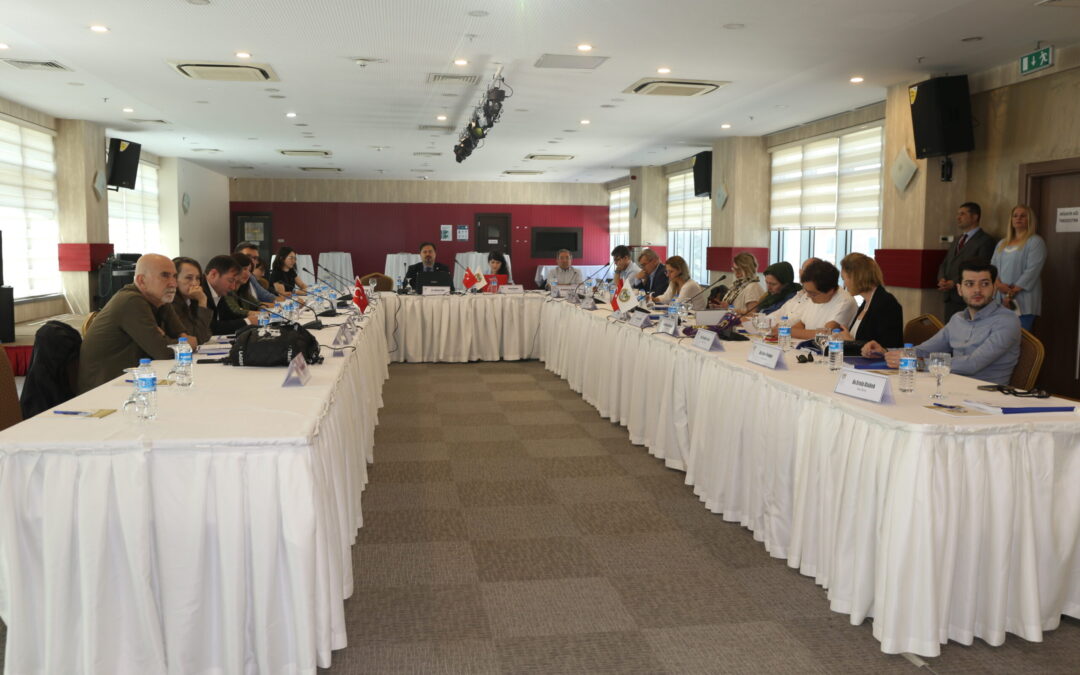
Turkey: Effective use of international human rights mechanisms in environmental protection training programme
The International Commission of Jurists (ICJ), in partnership with the Union of Turkish Bar Associations (TBA) Environment Law Commission and the Human Rights Joint Platform (IHOP), successfully conducted a training programme on “Effective Use of International Human Rights Mechanisms in Environmental Protection” between 5 and 10-11 June 2023.The training organised for the members of the TBA Environment Commission was delivered in two parts: online and face-to-face, providing a comprehensive exploration of human rights and environmental law.
Agenda in English TheUBA-Training_ENG
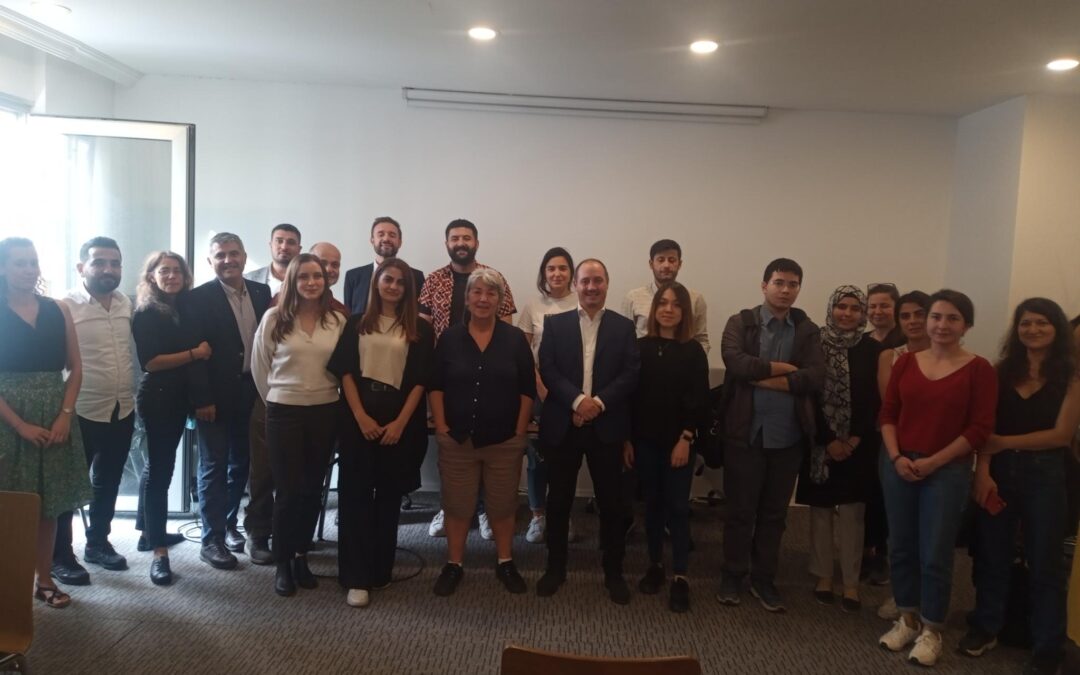
Türkiye: Empowering lawyers to protect the environment with human rights law
The ICJ, together with KAGED and the Human Rights Joint Platform has held a series of four trainings for lawyers and civil society in Türkiye to empower them in using human rights law to protect the environment.
